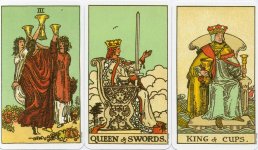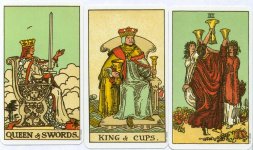rwcarter
For this next set of cards, we have Kings Cups (KC), 3 Cups (3C) and Queen Swords (QS). Cups are Water and Swords are Air. Water and Air are neutral to one another. Water is passive and Air is active. The triad is represented as WWA.
From my notes from the Supertarot website, all permutations of this triad are predominantly passive. WWA and AWW show emotions winning out over thoughts, leading to lots of dreams and fantasies and a total lack of reality. WAW represents an intellectual impulse arising from conflicting emotional experience and the need to replace emotions with logic.
Looking at the interactions under the main topics of Work/Career, Relationships, Finances and Home, we have:
Work/Career
WWA - Your workplace is lots of fun (3C), leaving you committed and loyal to the job (KC) even though logically you could do better elsewhere (QS).
WAW - You're the logical and rational voice (QS) in an office full of fun people/partiers (3S) and your boss is everybody's friend instead of the boss (KC).
AWW - You're committed to the job (KC) and enjoy the work you do (3C), despite your sharp-tongued and critical co-worker (QS).
Relationships
WWA - You're happy in your relationship (3C) with an emotionally mature man (KC) despite his hypercritical mother (QS).
WAW - You're becoming more vocal (QS) about all the partying (3C) your boyfriend (KC) is doing.
AWW - You're committed to your girlfriend (KC), but you miss hanging out with the guys (3C), which you don't do as much as you used to because your girlfriend gets on your case whenever you do (QS).
Finances
WWA - The amount of money you spend when you go out with the boys (3C) is starting to come between you (KC) and your wife (QS).
WAW - Rationally (QS), you know that partying every weekend (3C) isn't the most practical use of your money (KC).
AWW - Wise counsel (KC) from a sharp-tongued woman (QS) about the amount of money you're spending partying (3C).
Home
WWA - Your house is party central (3C) when your parents (KC and QS) are gone. Your dad is understanding (KC), but you know you're gonna hear about it from your mom (QS).
WAW - The woman (QS) runs the household because the man (KC) has a drinking problem (3C).
AWW - A loving household (KC) that's full of lots of joy and good times (3C), but you have a neighbor who's always complaining about all your celebrations (QS).
From my notes from the Supertarot website, all permutations of this triad are predominantly passive. WWA and AWW show emotions winning out over thoughts, leading to lots of dreams and fantasies and a total lack of reality. WAW represents an intellectual impulse arising from conflicting emotional experience and the need to replace emotions with logic.
Looking at the interactions under the main topics of Work/Career, Relationships, Finances and Home, we have:
Work/Career
WWA - Your workplace is lots of fun (3C), leaving you committed and loyal to the job (KC) even though logically you could do better elsewhere (QS).
WAW - You're the logical and rational voice (QS) in an office full of fun people/partiers (3S) and your boss is everybody's friend instead of the boss (KC).
AWW - You're committed to the job (KC) and enjoy the work you do (3C), despite your sharp-tongued and critical co-worker (QS).
Relationships
WWA - You're happy in your relationship (3C) with an emotionally mature man (KC) despite his hypercritical mother (QS).
WAW - You're becoming more vocal (QS) about all the partying (3C) your boyfriend (KC) is doing.
AWW - You're committed to your girlfriend (KC), but you miss hanging out with the guys (3C), which you don't do as much as you used to because your girlfriend gets on your case whenever you do (QS).
Finances
WWA - The amount of money you spend when you go out with the boys (3C) is starting to come between you (KC) and your wife (QS).
WAW - Rationally (QS), you know that partying every weekend (3C) isn't the most practical use of your money (KC).
AWW - Wise counsel (KC) from a sharp-tongued woman (QS) about the amount of money you're spending partying (3C).
Home
WWA - Your house is party central (3C) when your parents (KC and QS) are gone. Your dad is understanding (KC), but you know you're gonna hear about it from your mom (QS).
WAW - The woman (QS) runs the household because the man (KC) has a drinking problem (3C).
AWW - A loving household (KC) that's full of lots of joy and good times (3C), but you have a neighbor who's always complaining about all your celebrations (QS).




